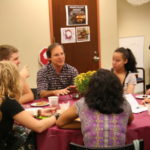Extracurricular Activities to Build Public Speaking Skills

It’s no secret that extracurricular activities are an important aspect of any high school experience. They allow you to branch outside of your academic interests, pursue your unique passions, and create an outward expression of your values and priorities in a way that will be of utmost importance on your college applications. Simply put, extracurricular activities are an outlet for expressing who you are and what you care about beyond the walls of your classroom.
There is also another advantage to extracurriculars that is less often reflected upon, and that is their ability to build life skills. Usually, we think of extracurriculars as a way that you can pursue the things you’re most interested in and build your profile as a college applicant. It is less often that we think of them as a way in which you can pursue and build the skills that you’ll need to be successful in your future career. Though we think of them in this light less frequently, it is no less a valid reason for pursuing certain activities.
For students who are interested in a career that requires public speaking, or who just want to build public speaking skills to use in other contexts, there are many different extracurriculars to choose from. Some build impromptu speaking skills, while others build rehearsed and even dramatic speaking skills. No matter their exact focus, all build confidence and poise in front of an audience. To learn more about extracurriculars that reinforce and build public speaking skills, keep reading.
Why Build Public Speaking Skills?
There are many career paths that involve public speaking, and many more that involved face-to-face communications on a daily basis. Teachers, lawyers, politicians, performers, and managers all rely on strong public speaking skills to do their work. Beyond that, any professional in an office or team setting will be expected to communicate professionally and confidently with those around them.
Furthermore, public speaking skills also build a foundation of broader soft skills, such as confidence, poise, and composure. These skills can be applied to almost any professional setting, including those that don’t necessarily require any public speaking.
Finally, the skills built by public speaking are the same skills used in a college interview. You will need to present a polished, articulate image of who you are and what matters most to you, often after having rehearsed some anticipated prompts. The soft skills that you build in extracurriculars that involve public speaking will easily translate to the college interview.
Extracurriculars That Build Public Speaking Skills
Mock Trial
In mock trial, students enact a modified court trial, with each participant playing the role of someone in a court hearing. Through this activity, students gain experience with the function of the courts while exercising their critical thinking, decision making, and speaking skills in a competitive context. Mock trial participants compete in local and regional contests throughout the year, culminating in a national competition in May of each year.
One unique aspect of mock trial is the potentially tense or emotional scenarios that can be presented. As students take on their parts, they are part-actor, part-presenter. Emotions can run high, and the ability to effectively communicate in a public, stressful setting will be paramount.
Students who participate in mock trial can expect to gain experience with logical reasoning, build confidence, and develop their ability to accept and use constructive criticism. Each of these skills easily translates into public speaking, and mock trial itself is composed almost entirely of students taking turns speaking before the group.
Speech and Debate
Speech and Debate are often the first activities that come to mind when you think about advancing your public speaking abilities. In Speech Competitions, a presentation by a single, a pair, or sometimes even a group of students is judged against a similar presentation by other teams in a round of competition. Specific events vary and range from limited preparation events that require impromptu presentations based on knowledge of current events, to prepared dramatic or humorous interpretations of powerful moments in literature, recreated for an audience.
In Debate competitions, individuals or teams of debaters work to effectively convince a judge that their side of a resolution is more valid than that presented by their competitors. In general, students in debate must work to understand both sides of a resolution, researching each extensively, and learning to think critically about every argument that could be made on each side.
As noted by the National Speech and Debate Association, “each event in speech and debate features a different form of public speaking and requires a unique skill set and talent.” Through participation, you can expect to build a broad variety of public speaking skills, from impromptu, unrehearsed monologues to deeply researched and prepared speeches. By doing so, you will also inevitably build your confidence, poise, and public speaking experience.
Members of Speech and Debate also learn about the nuances of public speaking. They delve into the importance of eye contact and body language, the tools of verbal persuasion, and the ability to think and respond on their feet.
Performing Arts
Another way to build your public speaking skills is through participation in the performing arts. This could include anything from theater or dramatic readings to poetry open mic nights. The skills required for these events are generally somewhat different from those required for Speech and Debate or Mock Trial, but they are no less relevant to public speaking.
In theater performance, dramatic readings, or poetry readings, you generally study a script or written piece and then memorize it, before presenting it dramatically to an audience. Sometimes you may be involved with putting on a whole play complete with costumes and sets, while other times you might be staging a brief dramatic reading in your everyday clothes. Whatever the case may be, you will still be practicing your public speaking skills.
For example, in a theater performance or a dramatic reading, you will more or less need to memorize a speech verbatim. There may be times when some improvisation is permitted, or when you are able to glance at some text, but for the most part you go into your performance knowing exactly what you must say and when you must say it. This memorization and presentation process is a valuable one when it comes to delivering powerful public speeches.
Similarly, you will practice your body language, your verbal expression, and your tone ahead of time, perfecting each to take on the character you hope to portray. In the performing arts, the way you say something is just as important as what you say, if not even more so.
By participating in the performing arts, you will continue to build the confidence and poise necessary to deliver a verbal message in front of a group. You will also learn how to project a certain image, and you will develop the ability to appear confident and poised, even when you don’t necessarily feel that way. These types of dramatic skills easily translate into public speaking skills.
Anything Involving Formal Presentations
Finally, public speaking skills can be developed through any activities that require formal presentations, whether they are delivered to a single person or to an entire audience. These types of activities might range from the science fair to tutoring to student council. In each of these activities, you will need to polish a performance to be delivered orally.
When you participate in science fairs, you will need to deliver a presentation about your project to the judges. You will need to outline the work you’ve done, express its importance, and demonstrate your expertise. Successful science fair competitors know that in order to accomplish this, you must practice the delivery of this presentation again and again, ideally receiving some feedback from others along the way. You’ll need to speak clearly and confidently, use precise terminology, and stay poised as you answer sometimes unexpected questions.
When you tutor students, especially if running a tutoring group, you’ll prepare your instruction ahead of time. You’ll need to learn the material to be taught and decide how to present it best. As a tutor, your job is to take complicated material and turn it into a simple presentation that’s easy for others to understand. Summarizing complex content can be a difficult job, but it’s a great skill to practice for public speaking.
Finally, in student council you will often use the tools of verbal persuasion to deliver campaign speeches and, if you’re successful, to address large groups at meetings throughout the year. You’ll need also to develop good listening skills to pair with your speaking skills in order to make sure that your classmates feel heard and validated.
There are many activities that build public speaking skills. While Mock Trial, Speech and Debate, and the Performing Arts are certainly among the most obvious, any activity that includes an element of oral presentation is a great start. By building strong public speaking skills, you prepare for a broad variety of career paths and ensure that you’ll be ready for your college interviews.
For more about extracurricular activities, see these great CollegeVine posts:
- Extracurricular Activities with Animals for High Schoolers
- Extracurriculars for the Prospective BS/MD Student
- Extracurricular Ideas for the Aspiring Journalist
- How To Become President of Your High School Club
- Demonstrating Leadership as a High School Sports Captain
- How to Start a Club in High School
- Community Service Projects for Music Majors
- A Beginner’s Guide to Starting Your Own Business In High School
Want access to expert college guidance — for free? When you create your free CollegeVine account, you will find out your real admissions chances, build a best-fit school list, learn how to improve your profile, and get your questions answered by experts and peers—all for free. Sign up for your CollegeVine account today to get a boost on your college journey.
Can't see the form above? Subscribe to our newsletter here.

